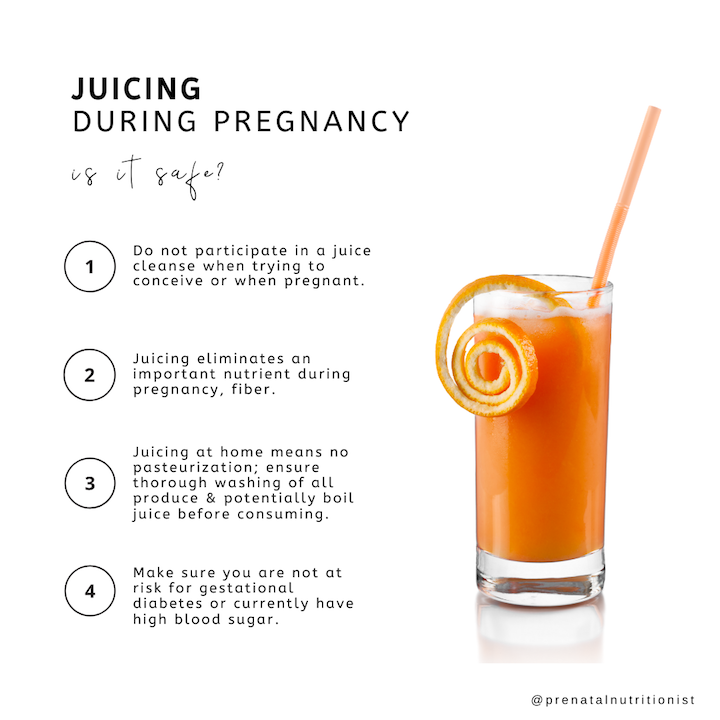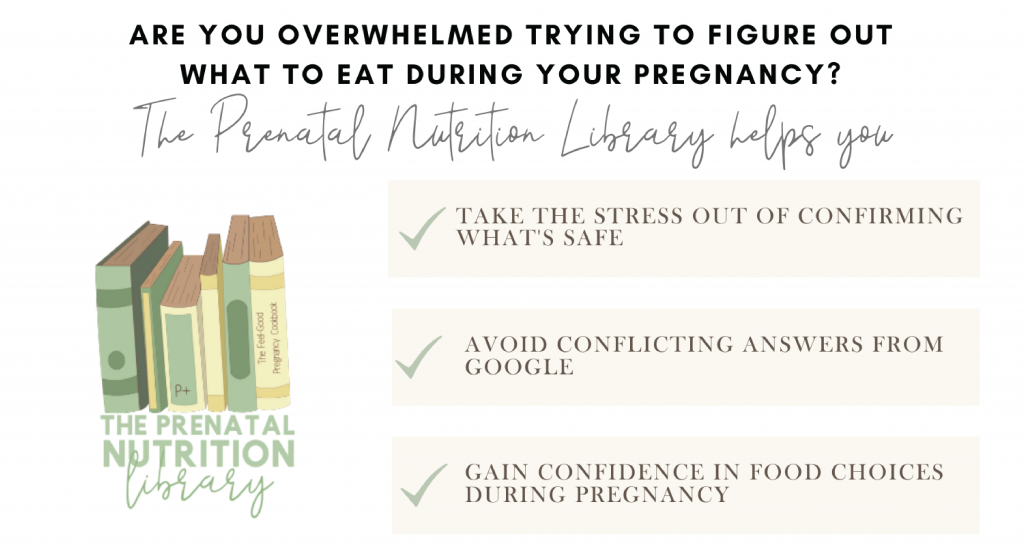Juicing has gained a lot of popularity in recent years. You may even have a friend or two who’ve done a juice cleanse, and maybe you have too. Now that you’re pregnant, you may be wondering:
Juicing During Pregnancy: Is it Safe?
What is juicing?
Juicing involves squeezing (literally) the nutrients out of a fruit or vegetables, or both. The process eliminates all solid matter that was part of the fruit or vegetable. There are many reasons why an individual would juice, with a popular one being to “detox”.
When someone goes on a juice cleanse to detox, it can last anywhere from 3 days to several weeks.
The belief is that the nutrients in the juice will eliminate built-up toxins in the body either by resting your organs, stimulating your liver, improving circulation, boosting your immune system, help with blood pressure, or passing them through urine or bowel movements (1).
Is juicing safe during pregnancy?
When you juice, you are eliminating an incredibly important nutrient from your diet, fiber.
During pregnancy, a lot of hormonal changes are happening, and oftentimes that can lead to constipation. Fiber is a great way to get everything moving again, and eliminating it from such a stellar food source is not recommended.
Fiber also lowers your risk for several diseases.
It does this by helping to sweep cholesterol away and out of the body when you have a bowel movement, and by lessening the blood glucose response by your body, which in turn keeps insulin levels lower too (1).
Choosing to participate in a juice cleanse while pregnant is not a good idea.
Your body needs adequate nutrition to fuel your baby’s growth, and doing a juice cleanse will not give you the number of calories or protein that you need to help your baby grow.
Below is the fiber difference between eating an apple versus drinking the juice.
Apple, whole
Fiber: 4.37 g
Apple, juiced
Fiber 0.2 g
All nutrients obtained from the USDA nutrient database.
It’s also important to note you often juice many more pieces of fruit than you would normally eat in one sitting. This results in more sugar consumption. Yes, this is naturally occurring sugar, but it still contributes to the rise in your blood sugar.
For example, to make 8 ounces of orange juice, it takes 4-5 oranges. You could easily drink 1 cup of orange juice, but most of us wouldn’t eat 5 oranges in one sitting.
We will discuss blood sugar and gestational diabetes risk in more detail below.
Benefits of juicing while pregnant
If you’ve ever had a conversation with someone or read a blog post by someone who completed a juice cleanse, then you know they usually swear it works and feel better.
When you juice at home, recipes include whole, fresh fruit and vegetables, which is exactly what the dietitian ordered– sort of. It’s a convenient way to get many vitamins, minerals, and antioxidants like beta carotene from various fruits and vegetables. However, juicing these leaves out one of their most important components, fiber, which we will discuss later.
When you drink fresh juice, you also tend to avoid processed foods, which many people are interested in. That means avoiding dietary sources of heavy metals and other scary-sounding additives and by-products (2).
While these anecdotal stories are inspiring and may even convince you to participate in a juice cleanse, there is no sound scientific evidence to support any of what juicing claims to do (3).
The liver, one of the largest organs in our body, helps us naturally eliminate potential toxins (4).
We previously discussed celery juice during pregnancy, specifically in a separate blog.
What about morning sickness?
If you’re having morning sickness, and find it difficult to keep food down, then a cold-pressed juice may be a viable option to help you get some of the nutrients you need for the time being.
Additionally, consider smoothies which also allow you to get a lot of nutrients in one sitting and can include plenty of protein to help you reach your daily needs.
Check out tips to combat morning sickness here.
Is It Safe To Do A Juice Cleanse While Pregnant?
Food safety
If you want freshly squeezed juices now and then (or one every day to supplement your intake), be sure you are buying pasteurized juices if they are store-bought juices. Drinking unpasteurized juices during pregnancy is not recommended.
By using high heat, the pasteurization process reduces the chances of harmful bacteria contamination, which can hurt your unborn baby and cause permanent abnormalities (5).
If you are home juicing, you will obviously not have access to commercial kitchen equipment to pasteurize your juice. For this reason, it is very important you thoroughly wash all produce with running water before juicing it, even fruits that you don’t eat the peel.
Additionally, if you want to be extra cautious, you can bring your juice to a boil for at least one minute before consuming it.
There may be juice shops or juice bars around every block if you live in a more “health-conscious” town or a bigger city. They may or may not heat treat their juices. Don’t be afraid to ask or inquire about their juicing process.
After assessing their store, food quality, and food safety practices, use your best judgment to make the right decision.
High blood sugar
Before buying a juicer or getting a local juice punch card, it’s important to ensure you are not at risk for gestational diabetes.
Since the fiber from the fruits and vegetables is juiced out, you have nothing left to aid in slowing down how fast your body absorbs the natural sugar. You’re left with sugary nutrition water – which isn’t problematic for everyone.
To reinforce the importance of fiber, we need to discuss another role of this crucial nutrient. It helps to control the rise in our blood sugar, making the sugar in whole fruits less of an issue.
Some studies have found a link between high fruit juice intake and increased risk of diabetes in and outside of pregnancy (6, 7).
Check with your doctor to ensure your blood sugar levels are within a normal range and not at a high level before you consume juices regularly.
The bottom line
While juicing can be fun and create community if you involve your friends, pregnant women may want to consider their options when it comes to juicing, at least until after the baby is born.
Enjoying a pasteurized juice, or a homemade one with adequately washed produce, once in a while will not harm you or your baby, and can give you a vitamin boost. You can also focus on eating healthy foods like fresh fruits and veggies.
Check with your doctor or dietitian if you plan to incorporate juices regularly into your prenatal diet.

If you would like to keep the fiber content of your delicious drink high, then consider making a smoothie instead. You still get all of the amazing nutrients that fruit and vegetables have to offer, while not sacrificing the fiber content, and the rest of the solid material.
Check out our recipe for a sunrise smoothie, it’s super easy to make, and has tons of fantastic nutrients for you and your growing little one.
By Alexa D’ Orazio, Dietetic Intern and Ryann Kipping, RDN, CLEC | Owner & Founder









